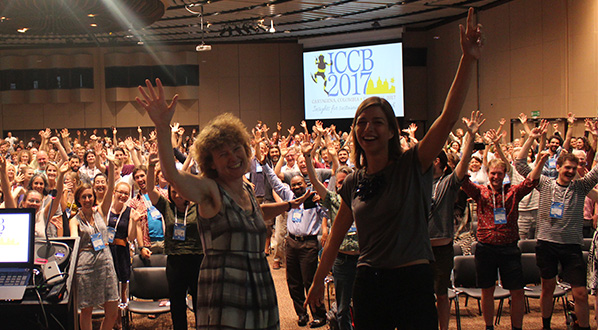University of Oxford
11a Mansfield Rd
OX1 3SZ
UK
Overview of the event
Lorem ipsum dolor sit amet consectetur. Sit fermentum dictum facilisi aliquam. Morbi gravida diam risus nam leo eu. Aliquam amet vulputate tortor feugiat malesuada mi viverra massa vestibulum. Augue aliquet massa eget nulla integer. Et arcu lorem vel blandit nibh elementum nulla ut ut. Eu egestas varius quam scelerisque. Eu at id lacus parturient dis molestie sed non odio. Tincidunt bibendum cursus eget eleifend est vel. Elementum tempus egestas nulla ut mattis aliquet.
Symposium: Aligning incentives for blue economy and biodiversity
Symposium: The True Impacts of Conservation Interventions: From Case Studies to Conceptual Advances and Policy Applications

Molly Grace: “Conservation Legacy: Using counterfactuals to measure past conservation impact for the IUCN Green Status of Species.”
Organizer: Johanna Eklund, University of Helsinki (on behalf of the working group)
Symposium abstract
We currently lack adequate knowledge of how different conservation strategies and other development interventions actually impact biodiversity and human wellbeing. Understanding true impact is crucial, both in terms of knowing which conservation interventions are effective and in terms of deciding where best to direct conservation funding. Although impact evaluation is well established in fields such as medicine and economics, it is still conceptually underdeveloped and relatively rarely applied in nature conservation. As a result, there have been numerous calls for more rigorous evaluation of conservation impacts. Recent methodological advances have resulted in an increasing use of counterfactual approaches (e.g. matching, randomized controlled trials). This symposium aims to present the recent advances in relation to impact evaluations of different conservation interventions (ranging from cash transfer schemes to alleviate poverty, to community-based species conservation programs, to protected areas). This will be achieved by (1) providing insights into different approaches for evaluating their environmental and social impacts, (2) discussing the strengths and limitations of these different approaches, and (3) exploring how new IUCN conservation standards and tools will mainstream such counterfactual measures of impact. The final panel session of the symposium will provide a platform for discussion on methods and best practice, research priorities, and how turn research results into policy and practice.
Abstract for Molly’s presentation
In 2021, the International Union for Conservation of Nature (IUCN) will launch the IUCN Green Status of Species, an extension of the IUCN Red List of Threatened Species. The Green Status of Species adds new metrics of species recovery and conservation success to complement the Red List’s traditional measures of species extinction risk. One of these measures of conservation success is a species’ Conservation Legacy, that is, the impact of past conservation actions on the species’ status. Conservation Legacy is evaluated using a counterfactual, and it has the potential to counter pessimistic narratives about the utility of conservation. Here, we discuss the methods that IUCN recommends to evaluate counterfactuals for the Green Status of Species, identify potential pitfalls and how to avoid them, and review examples of Conservation Legacy and discuss how they can be so powerful for incentivizing conservation.
Symposium: Evaluating the Impacts of Payments for Ecosystem Services on People and Behaviour in Cambodia
Symposium: Wildmeat and preventing future pandemics


Wildmeat and preventing future pandemics
In Central Africa, wildlife is hunted at an alarming rate and traded across vast distances to satisfy consumer demand for wildmeat. Both provincial towns and large cities are important demand centres, yet the drivers of demand differ. The lack of alternative proteins can be an issue in rural towns, while in large cities, consumption of wildmeat is a luxury. As urban populations grow, hunting pressures on wildlife increase, with significant impacts on forest ecosystems and consequences for threatened species such as pangolins and great apes. Although the growth in urban demand for wildmeat has presented an economic opportunity to rural communities, unsustainable offtake threatens rural food security in the long term. The COVID-19 pandemic has also been a reminder of the zoonotic disease risks associated with hunting and butchering wildmeat for consumption. Pathogens that have spread to humans from wildmeat in Central Africa include HIV, Ebola and monkeypox. The need to readdress our balance with nature has been brought to the fore, and reducing the scale of wildmeat offtake and trade is central to ensuring ecosystem and public health in Central Africa and globally. The scale of wildmeat offtake, how COVID-19 has changed perceptions of wildmeat and the potential for different intervention options to address the situation will be discussed.

